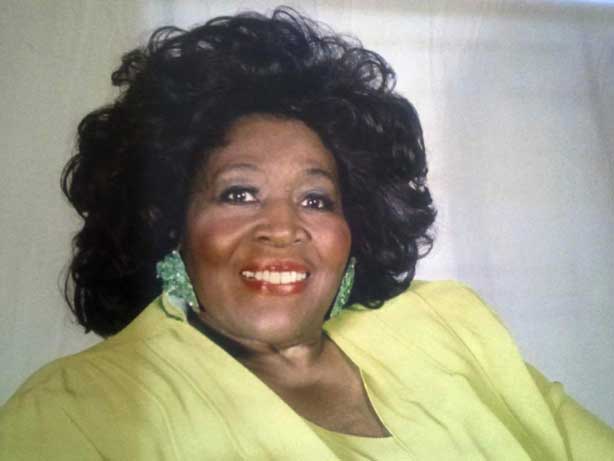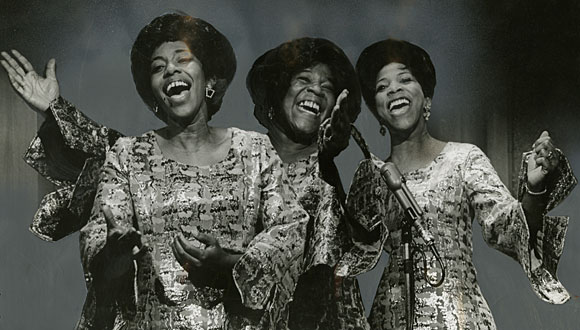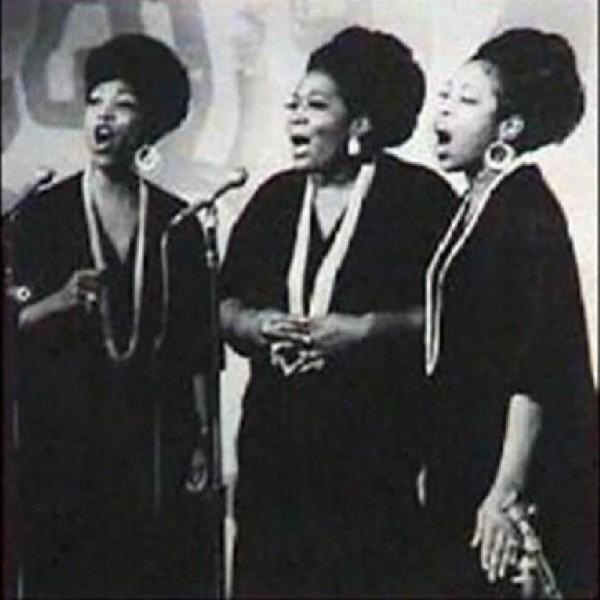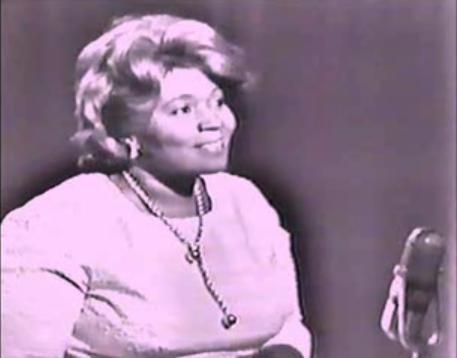Remembering Gospel Giant Delois Barrett Campbell
Perspectives On a Legendary Voice of Faith
I
Delois Barrett Campbell, a gospel giant as a member of the award-winning Barrett Sisters trio that electrified audiences worldwide with their powerful gospel harmonies, died on August 2 following a long illness. She was 85.Raised on Chicago's South Side and coached to sing by an aunt, the Barrett Sisters--Delois (the oldest), Billie Barrett GreenBey and Rodessa Barrett Porter--have been hailed by gospel historians as the greatest female trio in the music's history the greatest female trio in gospel history.
The trio shared a gospel lineage with the greats. In the girls' youth, Thomas A. Dorsey the father of gospel music, was stirring up change as music director of the city's Pilgrim Baptist Church, where he mixed the worldly and the sacred during the Great Depression.
The Roberta Martin Singers, a touring gospel group, emerged from Pilgrim Baptist's youth choir, and Campbell joined it when she was in high school. The popular music of the Andrews Sisters also influenced Campbell and her sisters. When they were young, they practiced blending their voices on both religious and secular songs. The sisters recorded their first album, Jesus Loves Me, in the mid-1960s.
The Barrett Sisters (from left): Rodessa Barrett Porter, Delois Barrett Campbell, Billie Barrett GreenBeyNew generations discovered the Barrett Sisters when they appeared in the 1982 documentary Say Amen, Somebody.
"I believe she was born to sing," Mary Campbell said of her mother in a July 2011 interview with The Associated Press. "Each time she sang it was as if she were performing to a cathedral full of people, no matter how small the group was."
New Yorker film critic Pauline Kael described the trio as "dramatic, physically striking women with ample figures in shiny, clinging blue gowns." She wrote that they "sing so exhilaratingly that they create a problem." Kael wanted more music, less talking, in the film.
The film opened doors for the Barrett Sisters, Mary Campbell said. "That's when they began their European travels," she said. "It gave them the publicity they couldn't afford."
The sisters appeared in Patti LaBelle's 1990 television special Going Home to Gospel. In 2008, they received the Ambassador Bobby Jones Legend Award at the Stellar Awards, the national gospel music awards show.
Campbell's husband, the Rev. Frank Campbell, died in 2000. The couple had four children; two are deceased.
The surviving members of the Barrett Sisters, Rodessa Barrett Porter and Billie Barrett GreenBey, sang with guest vocalist Tina Brown in March 2011 to celebrate Campbell's 85th birthday at a gospel concert in a Chicago church. Campbell, her voice diminished to a whisper, watched from a chair near the altar.
In a video clip from the concert, Brown paid tribute to Campbell. "She is my personal queen of the gospel," Brown said.
Copyright 2011 The Associated Press.
II
The Barrett Sisters, ‘Eternal Life Medley’ (‘Come and Go With Me to My Father’s House/New Name Over In Glory/Believe I’ll Testify/Glory Glory Hallelujah’)A Portrait of The Barrett Sisters: 'Still On a High Note'
On March 26, 2006, Chicago Tribune reporter Howard Reich visited with the Barrett Sisters on the eve of Delois Barrett Campbell's 80th birthday. Delois was bedridden at the time, having recently returned home after being hospitalized, but her spirit was undiminished. Poignant and powerful, Reich’s piece the finest (and warmest) latter-day portrait of the sisters. Reich artfully weaves the historical panorama of the trio's professional lives into the narrative even as he captures the warmth and humor infusing the sisters' unshakable bond. A printer-friendly version of the story is at www.fredericksburg.com.
They don't move as nimbly as they once did, and their performance career mostly has receded into the history books.
But when they begin to sing, the Barrett Sisters--widely considered the greatest gospel trio ever assembled--still give voice to the angels.
Singing as if from a single spirit, caressing phrases with ineffable tenderness and grace, harmonizing as adroitly as perhaps only three siblings could do, they sound like no other ensemble on this Earth.
As if to prove the point, on a recent weekday afternoon they burst into Thomas A. Dorsey's "Take My Hand, Precious Lord," a gospel anthem. They were preparing to mark the 80th birthday of Delois Barrett Campbell, the eldest of the sisters.
At the moment, Campbell is sitting up in bed, having recently returned home from a hospitalization, her sisters seated on either side of her, beaming.
All at once, that famous sound--sweet chords, honeyed tones, lovely legato lines--resonates throughout Campbell's South Side home, everyone else in the house rushing into the bedroom to savor this music.
Two choruses later, the impromptu audience applauds noisily, struck anew by the enduring, lustrous beauty of this work. Like Campbell, her sisters may be heading inexorably toward octogenarian status, but on strictly musical terms the trio has lost virtually nothing to the passing decades.
"We're some old chicks, but we're still here!" cracks Billie Barrett GreenBey, 77, generating laughter all around.
"And we still love to sing," adds Rodessa Barrett Porter, 75.
A variety of ailments--related to complications from Campbell's arthritis--have left her bedridden, but she and her sisters were determined to mark the 80th birthday in church, with music.
"I want to spend that day giving glory to God," says Campbell, who insisted she be released from the hospital to prepare for the concert.
"A lot of people could have given up. Singing in a wheelchair is no joke," she adds.
The Barrett Sisters, ‘Walk and Talk With Jesus’Surely it's precisely that kind of grit that enabled sisters who never had the benefit of voice lessons to forge one of the most revered gospel ensembles in the world.
Blessed to have been born to a father who was a deacon and a mother a chorister, the Barretts grew up alongside the founders of gospel music, an art form that first blossomed on the South Side of Chicago, in the late 1920s and early '30s.
Gospel songwriter Dorsey, who essentially invented the genre by applying blues techniques to hymns and anthems, lived in the neighborhood and had frequent contact with the family. And Dorsey disciples such as visionary singers Mahalia Jackson, Roberta Martin and Clara Ward always were within earshot, inspiring the sisters.
Yet while the Barrett siblings routinely harmonized at home, they didn't see a professional future for themselves until they heard--of all things--a popular white vocal group on the radio.
"We loved the Andrews Sisters," recalls Porter, citing a seemingly unlikely inspiration for a black gospel ensemble.
"They harmonized so well that we started to harmonize with them, when we heard them on the radio.
"We really modeled ourselves on them."
The Barrett Sisters, ‘He Has Brought Us,’ from ‘Say Amen Somebody!’With one notable difference: The Barretts never sang Andrews Sisters hits such as "Bei Mir Bist du Shoen" and "Boogie Woogie Bugle Boy" when their father was around. In his presence, and in church, they focused on decidedly more spiritual fare.
By 1941, Delois and Billie joined with cousin Johnnie Mae Hudson to form the Barrett & Hudson Singers, a precursor to the emergence of the Barrett Sisters, which Rodessa formally joined around 1950. That was the year each of the sisters got married--"Nobody wanted to be left at home," jokes Campbell--and began devoting themselves to music preaching faith and deliverance.
Considering that the Andrews Sisters sold tens of millions of records, why didn't the Barretts try to follow them into the commercial big time?
"I think it's because in the 1930s our brother and three sisters died from tuberculosis," explains Porter. "Because of that experience, because we saw them suffer, we got to know God.
"And because no one else in our family got tuberculosis, we saw that God is good."
The loss, said GreenBey, "taught us that you have to believe. It made us put our trust in God, and it made us want to sing to his glory."
Did they ever. Starting in 1963, they began releasing a series of albums on Savoy and other labels that set a new standard for the art of gospel ensemble singing. "Jesus Loves Me," their first release, set the stage for more than a dozen to come, notably "God So Loved the World" (1972) and "Coming Again So Soon" (1974).
"Their harmony is special, probably the best in female gospel," wrote Anthony Heilbut in his landmark study, The Gospel Sound: Good News and Bad Times (Limelight Editions).
Indeed, to anyone who has heard the Barretts live, the trio embodies the meaning of gospel music while imbuing it with unassailable technical virtuosity.
"They always bring the audience out of their chairs," says Morris Phibbs, assistant director of the Center for Black Music Research at Columbia College Chicago.
"They express a feeling that kind of relieves trouble," adds Pam Morris, coordinator of the Chicago Gospel Festival and host of a gospel radio show.
"They uplift you."
The Barrett Sisters, from a Gaither Homecoming concert, ‘Til We Meet Again’For the Barrett Sisters, however, a great deal of struggle underlies the unmistakable optimism of their music. Though they have played to cheering audiences around the world, and especially in Europe, their remuneration has been slight, leading GreenBey and Porter to hold day jobs throughout their singing careers, while Campbell often sang funerals to make ends meet.
On some occasions, payment for performances never came through, and record royalties never were significant.
"We were so happy to sing that we didn't handle the business," GreenBey once told the Chicago Tribune. "But at least we were fortunate that we had husbands and families to help support us, so we didn't worry about it."
Moreover, each experienced a measure of pain at being separated from her family during long and grueling tours, they say.
Campbell's late husband often complained that he wanted his wife at his side, not on the road, an argument between the two famously captured in the celebrated gospel documentary film Say Amen, Somebody! (1982), which brought the Barrett Sisters a new degree of crossover fame, if not fortune.
The latest blow, they say, was the January fire that destroyed Pilgrim Baptist Church, which Dorsey's musical direction had transformed into the birthplace of gospel.
"We grieved over that, because there are so many precious memories and concerts and sermons that took place in Pilgrim Baptist," says Campbell. "There was no other place just like it."
As for gospel music today, the Barretts regret the perhaps inevitable transformation of the music, which now typically includes vast electronic instrumentation and choreography that once would have been considered sacrilegious.
"We used to stand flat-footed and sing--we expressed everything with our hands and our faces and our voices," says GreenBey.
"Now they shake their hips.
"But if the new music still gets people to come to church, then it's all right," she adds.
"That's really all that matters."
With Tina Brown sitting in for DeLois, Barrett Sisters Billie Barrett GreenBey and Rodessa Barrett Porter celebrate their sister’s 85th birthdayIII
From The Barrett Sisters website
For over thirty years, Delois Barrett Campbell, Billie Barrett GreenBey and Rodessa Barrett Porter, internationally known as The Barrett Sisters, have lifted their voices to Praise the Lord!
Called "The Sweet Sisters of Zion" by many because of their special vocal blend, these internationally known gospel singers are natives of Chicago, Illinois. As children during the thirties, they were coached by their aunt, Mattie Dacus, and began singing with a cousin. raised by religious parents, they, along with their seven other siblings, were not allowed to listen to the popular blues of the day but it is evident that they heard it somewhere as it forms an underlying current throughout their work.
Their young lives effected by the tragedy of the depression and marred by the results of poverty and sickness (they lost several siblings to the then prevalent tuberculosis), they had no dreams other than that of survival. Like many of their contemporaries, they thought that the only hope musical talent might have would be in the secular world. But they knew that this would deeply hurt their parents as the older Barretts truly believed that worldly music had no place in the lives of the saved.
While still in high school, Delois, the eldest of the three girls, began singing with the world famous Roberta Martin Singers, emerging as one of the nation's greatest soloists. When her friend, the great Dinah Washington, suggested that she forsake gospel and pursue the blues as she had done, Delois was truly tempted. But after much consideration and prayer, she soon realized that the blues wasn't what God had in mind for her. But she wished her friend much success and was deeply saddened when Dinah didn't live long enough to enjoy her own accomplishments.
The Barrett Sisters, ‘I’m Going To Fly Away,’ Quinn Chapel, Chicago, 1991Her work with the Roberta Martin Singers, although not a lucrative endeavor, took her around the country and introduced her to the world. But this too soon came to a halt when she married and started raising a family. Her work would now be relegated to her home and to being a pastor's wife.
Meanwhile, her sisters were busy studying their craft and pursuing family life as well. By then, Billie had now become a soloist in her own right and Rodessa was writing music and directing a choir in Gary, Indiana. In the mid-sixties, the sisters regrouped and, with the help of Roberta Martin and countless others, went on to record their first album on the Savoy label, "Jesus Loves Me." Since that time, The Barrett Sisters have become one of the world's leading female gospel groups and one of the oldest groups to still travel and perform.
Throughout their career, The Barrett Sisters have been associated with celebrities and big names in entertainment. In the 1940s, they joined the Thomas Dorsey National Singers Convention. Since then, The Barrett Sisters have appeared with numerous stars including the late Rev. James Cleveland, Andre Crouch, The Mighty Clouds of Joy, Shirley Caesar, The Winans and Patti LaBelle.
The Barrett Sisters have performed at countless churches and in may prestigious concert halls including the Lincoln Center in New York City; Constitution Hall in Washington, DC; Orchestra Hall in Chicago; and Theatre DeVille in Paris. In 1983, they represented the United States as Goodwill Ambassadors to Africa and in 1987, they spent six weeks representing the country in the South Pacific. They have performed for several dignitaries including the King of Sweden and the President of Zaire, Africa. As of 1995, they had toured internationally more than thirty times.
In addition to their paid performances, they have also done countless benefits for many organizations, among them the National Council of Negro Women. They have also made a special effort to use their talent to help young people who have aspirations in the music field. In tandem with this, they regularly contribute to the United Negro Fund.
The Barrett Sisters, ‘Because He Lives, I Can Face Tomorrow,’ live, 1983All of the sisters are active in their local churches and in the community. They make a special point of using their celebrity status to encourage their neighbors, friends and fans to make use of their right to vote.
In the 1960s, they began appearing on radio and television shows nationwide. Among their many appearances, they have been guests on The Tonight Show with Johnny Carson and The Oprah Winfrey Show. They've been featured many times on the locally produced Emmy award winning Jubilee Showcase and have also appeared on The Stellar Awards; The Bobby Jones Show; Living the Dream; a television tribute to Dr. Martin Luther King; and The PTL Club. In 1982, the Barrett Sisters were featured in the critically acclaimed documentary Say Amen, Somebody! and in 1990, they were selected to appear in the PBS special Going Home to Gospel with Patti LaBelle. Last January, they, along with countess other gospel legends, participated in a video wonder produced by Ed Smith and Bill Gaither entitled "On My Way to Heaven." Long time recording artists, The Barrett Sisters most recent release is on I AM Records and is entitled What A Wonderful World.
***
IV
‘Their Gospel Recordings Have Touched Millions’
A statement from the Chicago Gospel Music Heritage Museum
Upon learning of Delois Barrett Campbell's passing, The Chicago Gospel Music Heritage Museum, by way of board member Mark S. Allen (hailed by the Rev. Al Sharpton as "one of Chicago's legendary political activists"), posted the following tribute to the life and legacy of the artist.
On behalf of the Rev. Dr. Stanley Keeble, founder and curator of The Chicago Gospel Music Heritage Museum, we extend our sympathies to the family and fans of Delois Barrett Campbell who we got word died this morning (Aug. 3) at the age of 85. Delois Barrett Campbell and The Barrett sisters were living legends from the Chicago community and legacy of gospel music.
Delois Barrett Campbell and The Barrett sisters were students of the father of gospel music Thomas Dorsey as he founded gospel music from the Southside of Chicago at the historic Pilgrim Baptist Church. And Delores at a young age in high school was a part of the historic Roberta Martin singers, and from there The Barrett sisters were born and since the 1960s to today have been ongoing staples in the legacy of gospel music.
Delois Barrett and her sisters came into our homes on a regular basis as some of the featured artists on this historic gospel TV show Jubilee Showcase on Chicago's ABC Television station, and their music and performances were featured throughout the civil rights movement, led by Rev. Dr. Martin Luther King Jr and they followed that modern day legacy by always being active supporters of the civil rights leadership of Rev. Jesse Jackson, through Operation Breadbasket, PUSH, Rainbow PUSH and his historic Presidential Campaigns, and of course their gospel recordings have touched millions in Chicago and across the world.
The Barrett Sisters perform Thomas A. Dorsey’s ‘Precious Lord, Take My Hand’No matter how much notoriety Delois Barrett Campbell received around the world, she and the sisters were always deeply rooted in Chicago, always lending their voices to many causes. Our founder and Curator of The Chicago Gospel Music Heritage Museum, Rev. Dr. Stanley Keeble, a legendary musician and artist in his own right, was also one of those who grew up with Delois and performed with other greats like Mahaila Jackson, Rev. James Cleveland, and another we recently lost, the great Albertina Walker.
The Chicago Music Heritage Museum praises the life, music and legacy of Delois Barrett Campbell and will work to ensure that we help preserve her legacy as an example of so many future generations of gospel musicians, artists, and fans of the traditional legends of Gospel music headquartered right here in Chicago."
Rev. Dr. Stanley Keeble, Founder/Curator, Chicago Gospel Music Heritage Museum 773-901-7022
MARK S. ALLEN, Daily News Blog/Commentary, AND THE ORDINARY PEOPLE SAID, www.chicagonow.com, 773-392-0165
http://www.chicagonow.com
Founder/Publisher/Editor: David McGee
Contributing Editors: Billy Altman, Laura Fissinger, Christopher Hill, Derk Richardson
Logo Design: John Mendelsohn (www.johnmendelsohn.com)
Website Design: Kieran McGee (www.kieranmcgee.com)
Staff Photographers: Audrey Harrod (Louisville, KY; www.flickr.com/audreyharrod), Alicia Zappier (New York)
E-mail: thebluegrassspecial@gmail.com
Mailing Address: David McGee, 201 W. 85 St.—5B, New York, NY 10024






